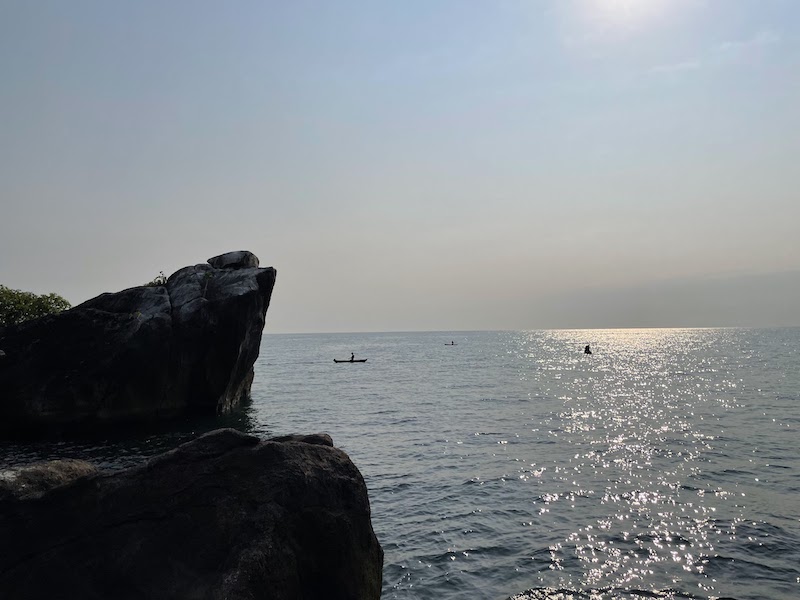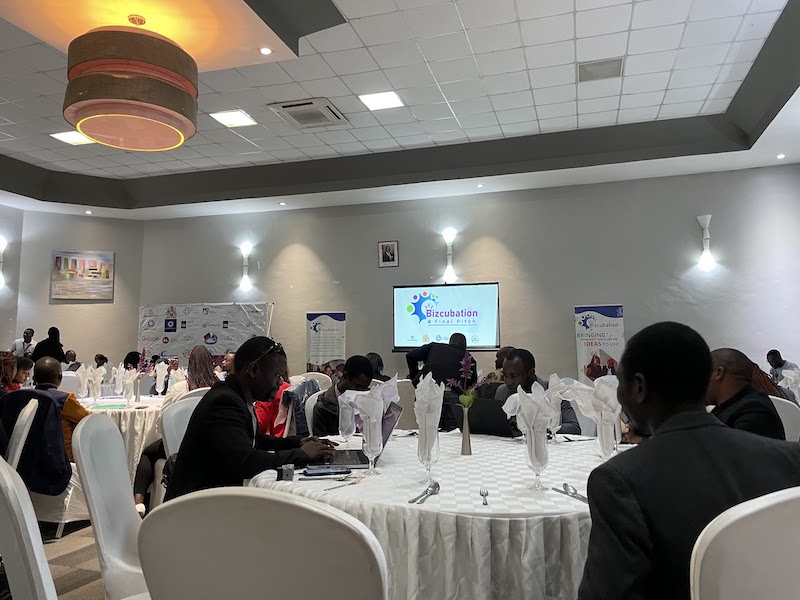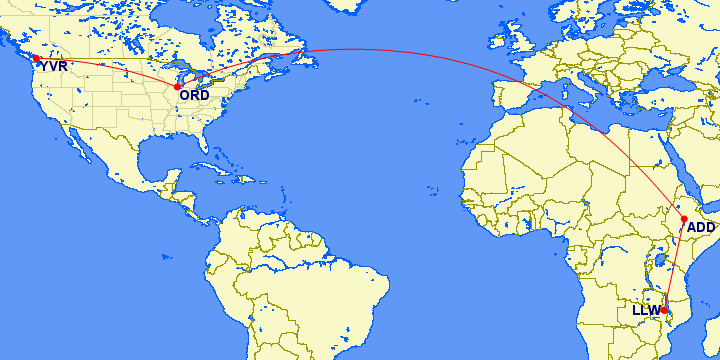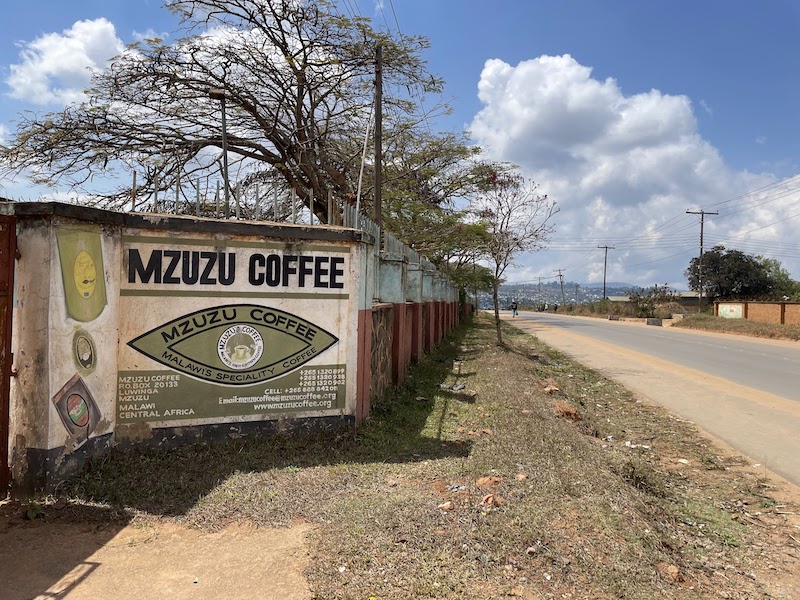On July 28, 2023, I moved to Malawi, a beautiful landlocked country in southeastern Africa, for a Canadian international volunteering program at World University Service of Canada (WUSC). The program is funded by the Canadian government, and the organization sends Canadians, including permanent residents, to developing countries to advance Canada’s Feminist International Assistance Policy.
As of writing, I've already spent three weeks in the country. Interestingly, there hasn't been much of a culture shock so far, probably because I visited mostly urban areas where we see a lot of influences from Western countries; at a surface level, if you subtract the economic growth from Southeast Asia, it's here.
 * Lake Malawi, the source of fresh and delicious fishes like chambo and usipa.
* Lake Malawi, the source of fresh and delicious fishes like chambo and usipa.
However, the reality isn't that simple, and one of the poorest countries in the world is suffering from various forms of gaps, between rich and poor, urban and rural, and the other countries. These gaps are the very reason why I'm here, and you can read more about the motivation at my fundraising page.
My little role inside the systems
First and foremost, I want to be clear that I don't intend to make an anti-capitalism statement, and I do value its benefits. Yet, I don't want to ignore a sense of weirdness my past experience brought to me, and that's why I'm here to take action.
In my limited experiences at start-up companies, Big Tech, and as a freelancer, money always mattered the most in the tech industry, regardless of how nice an organization's vision sounds. Thus, the voices of those who do not contribute to their financial growth are often suppressed. It's very unfortunate to see these phenomena over and over again; I can assure you that there are still a lot of problems the classic technologies can address, and in developing nations, there is more to do before investing in revenue-generating nice-to-have technologies such as AI, Big Data, and VR/AR. After being part of the imbalanced systems for 10 years, I started feeling guilty, and I have reached the conclusion that something is going wrong in our world.
The power dynamics remind me of the dilemma in the food industry growing over the last decades, where brands' business interests have conflicted with what's good for the greater society, meaning everyone's health. In this kind of situation, I'd like to question whose life we are living. That is, we need to cultivate literacy both at the producer and consumer side. If the world population becomes aware of alternative options and accumulates better choices with an intention, our society could collectively be liberated and exposed to further possibilities for a bright future.
With the interpretation of our world, this is the beginning of my field study on the flow of information. On the one hand, it is true that the country's low internet penetration rate hinders Malawians from accessing to rich information people enjoy in developed countries. On the other hand, local entrepreneurs are passionately tackling their immediate issue, mostly in agriculture, by gathering whatever resources they can find in the communities, and the limited access to information hardly disempowers them.
 * I attended a business plan competition in which Malawian young entrepreneurs demonstrated a variety of problem-solution pairs to empower the country's economy.
* I attended a business plan competition in which Malawian young entrepreneurs demonstrated a variety of problem-solution pairs to empower the country's economy.
Systems are always multifaceted, and hence we cannot understand reality without fieldwork. For the next 12 months, I regularly report my observations, especially from the perspective of information technology, in this blog, as well as LinkedIn, Twitter (X), and Instagram.
Frequently Asked Questions
Since software development is considered one of the most "successful" occupations in the Western world lately, many of my friends and family members have seriously questioned my decision to volunteer in Africa; they all looked so confused when I first shared the next step. Now, I think I should officially address some of the common questions I've received over the last couple of months.
Where is Malawi?
Malawi is a small landlocked country in southeastern Africa. It took almost 30 hours from Vancouver to the capital, Lilongwe, including transit.

Furthermore, my place of assignment is a five-hour drive from Lilongwe to North. It's the third largest city in Malawi called Mzuzu. Situating at about 1200m elevation and a one-hour driving distance to Lake Malawi, Mzuzu is best known for producing natural rubber and coffee beans.
 * Entrance of the Mzuzu Coffee factory we visited last week.
* Entrance of the Mzuzu Coffee factory we visited last week.
In short, it is very far from where most of my close friends live.
Why Malawi?
To be honest, there was no particular reason why I chose Malawi among many developing countries. In fact, volunteering opportunities that are relevant to software engineering and information science are very few. When I looked at the list of organizations partnering with Global Affairs Canada's volunteer cooperation program, I could only find two positions in Ethiopia and Malawi. So, I applied for both, and I got accepted by the latter.
That said, it didn't take too long until I deeply related myself to Malawi, because I learned how strong their relationship with my home country Japan is; they have maintained diplomatic relations with Malawi for more than 50 years, and I saw a lot of Japanese used cars, people from Japanese international volunteer program, and Malawians who are curious about Japanese culture. Now, I appreciate the opportunity to view this country from a mixed perspective between Japanese and Canadian.
What are you going to do there? Will you make a well, I guess?
My role as an Information Communication and Technology Advisor is to promote equitable access to ICT, especially for young people, through the lens of gender equality and social inclusion. At Mzuzu Entrepreneurship Hub (Mzuzu E-Hub), I support their technical integration activities as part of their signature programs, Media Information and Literacy Education (MILE) & Business Incubation (Bizcubation), so that people in Malawi can get equitable access to digital literacy and skills, and business and employment opportunities.
In practice, I'd contribute to software development projects, mentor young people, and support the organization's digital communication and data management strategy, for example. At a high level, these are essentially the same as what I have done for the last decade, but the use of technology is not for generating revenue but rather for making information more accessible. It should be noted that, despite the country's low internet penetration rate, the Digital 2023: Malawi reported that half of the population in Malawi is under 18, which has enormous potential for empowering the country's economy, and more than 80% of the population lived in the country's rural area, where digital technologies play a critical role in development.
Don't you focus on a lot of problems you already have in Canada or Japan?
Of course, I'm deeply concerned about the issues in Canada and Japan, where I've spent a meaningful amount of time in my life. My focus includes but is not limited to their economic, environmental, and educational challenges, and I kept doing my best to make a positive influence, especially after I became an independent. Volunteering, mentoring, paying attention to local news, applying for jobs that I can work for social good, etc. Among the diverse actions and decisions I have taken, this Canadian international volunteer program eventually stood out, so I decided to take the opportunity. After all, it's a matter of timing.
You should rather make a business/NGO and hire people who work in Africa. This is more scalable, isn't it?
I don't disagree, but I am a strong believer in experiential learning. I heard about many challenges African countries are facing, and I could research online to collect more information about them and come up with potential solutions. However, those insights are not from my experience, and I'm not convinced by the objective information; whenever I start something new, there is always a strong intrinsic motivation. I caught a sense of "something is wrong" from past experience, so I came to Africa. But what kind of resources do the locals really need? I do not know, so I'm here to experientially figure this out.
Does the chapter of your life in Canada end?
No. As this is a Canadian international volunteer program, Chapter Canada is still continuing. The highest priority is to promote Canada’s Feminist International Assistance Policy, and my public engagement activities target Canadians in the first place. Meanwhile, my return flight ticket departing a year later brings me back to Vancouver anyway, and hence my connection to Canada will seamlessly continue afterward.
How do you earn money?
I will receive a monthly living allowance from the Canadian organization, based on the local's average cost of living. The amount is hardly called "income", but considering this is a volunteer program, I see the allowance as extremely generous support. Note that the product prices are roughly 1/6 of Vancouver based on my observation so far, and one of my friends said:
So, if you can get a good job, you live like a king. And, are you saying a good beer is $2?
Correct. But the real problem is that there is neither "good job" nor "good beer" available here in Malawi.
I continue my freelance job, so it could be another income source. However, since I volunteer full-time on weekdays, the degree of commitment will definitely be limited.
Africa...I think you will get sick and die...
Let's hope nothing happens. To prepare the best, I received six different vaccines at a travel clinic before the departure, and I bought 400 malaria pills to take every day for an entire year. But in the end, whatever happens, happens. No worries, I already wrote a will just in case.
How do you manage your hobbies like running, hiking, and craft beers?
That'd be the biggest problem I'm afraid of.
So far, I have been able to run 1-2 times a week for about 30 minutes each, but I don't think I can run longer because the road conditions are extremely bad; there is clearly a safety concern that hinders me from staying active in a city. Having said that, it's Africa, and there are a lot of destinations where I could enjoy outdoor activities, such as Lake Malawi, Mt. Mulanje, and national parks.
As for beers, there is no local craft beer, and the only "local" beers are those domestically brewed by international brands, Carlsberg and Castel. They are basic lagers, which are something you expect to drink in Southeast Asia. When I get bored, I buy imported beers from other African countries. For now, I am happy with these "okay beers".
What would you do after the volunteer assignment? What's your goal, after all?
Ultimately, I'd like to strengthen our real life in this information-rich world by the fair use of science and technology. In order to get there, I have a couple of options in my mind, but I'll leave the topic for later articles. Right now, I believe I must be open-minded and focus on this very moment here in Malawi.
If you have any other questions or comments, feel free to directly reach out to me by email or social media.
This article is part of the series: Digital Malawi: Developing Hope in the Information Age Becoming a CanadianSupport
Gift a cup of coffeeShare
Categories
Life & Reflection Society & Business
See also
- 2024-06-24
- The End of the Beginning—What I Talk About When I Talk About Malawi
- 2024-01-31
- Relativize Malawi, and Rethink Their Contexts
- 2023-09-08
- Definition, Role, and Current Status of Digital Literacy in Malawi #LiteracyDay
Last updated: 2023-08-23
Author: Takuya Kitazawa
I am an independent consultant, mentor, and advocate for sustainable technology development with a decade of experience in AI/ML products, data systems, and digital transformation. Based in Canada and originally from Japan, I have lived and worked globally, including part-time residence in Malawi, Africa. See CV for more information, or contact at [email protected].
NowDisclaimer
- Opinions are my own and do not represent the views of organizations I am/was belonging to.
- I am doing my best to ensure the accuracy and fair use of the information. However, there might be some errors, outdated information, or biased subjective statements because the main purpose of this blog is to jot down my personal thoughts as soon as possible before conducting an extensive investigation. Visitors understand the limitations and rely on any information at their own risk.
- That said, if there is any issue with the content, please contact me so I can take the necessary action.